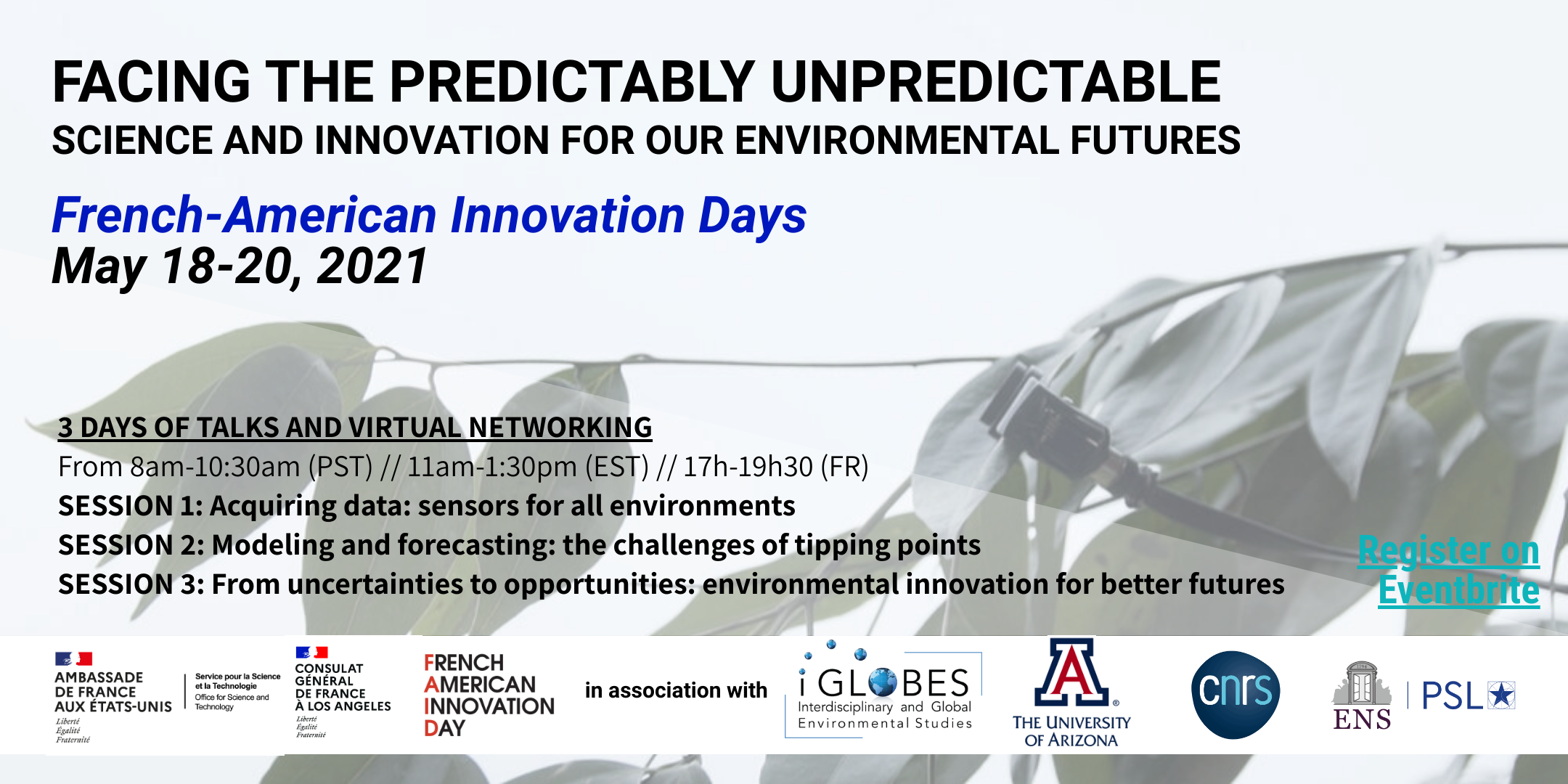Over the past decade, the concept of tipping points, related to climate change and ecosystem disruption, has gained widespread acceptance and interest. Increasingly, scientists are seeking to understand, analyze, detect, and prevent thresholds that identify the points at which a small change could tip a system into an undesirable state that would be difficult or impossible to reverse.
In partnership with iGLOBES, the interdisciplinary and international laboratory between the University of Arizona, CNRS and ENS – PSL, the Office for Science and Technology of the French Embassy based in Los Angeles was delighted to welcome French and American researchers and entrepreneurs for three sessions of presentations and opportunities to meet on these rapidly expanding themes.
Prestigious speakers did the honor of opening Session 1: Julie Duhaut-Bedos, Consul General in Los Angeles ; Joaquin Ruiz, Professor, Vice President of Global Environmental Futures, Director of Biosphere 2 ; and Sylvette Tourmente, Director of the CNRS Office for the United States, Canada and Mexico. These opening remarks expressed France’s ambitions against climate change and highlighted the recent agreement of the first-ever International Research Center between the CNRS and the University of Arizona.
This French American Innovation Days was successfully held over three days and hosted high-level speakers. We are pleased to share the replays of the presentations of these three sessions (full program here).
SESSION 1 (18 mai 2021) : Acquiring data: sensors for all environments
- Scott Saleska Professor, Ecology & Evolutionary Biology, University of Arizona
- Acquiring Data to Scale from Molecules to Ecosystem, Standing on the shoulders of both Joseph von Fraunhoffer and Carl Woese
- Denis Machon, Associate Professor, University Lyon 1, Visiting Professor, Université de Sherbrooke
- Design of sensors for monitoring the environment and ecosystems: from the definition of specifications to production
- Roser Matamala, Terrestrial Ecologist, Argonne National Laboratory
- Wireless Underground Sensor Networks for Advancing Agriculture and Terrestrial Ecology
- Dan Angelescu, CEO & Research Director – Fluidion
- Resilient sensors for autonomous water quality surveillance
- Arnaud Lacourt, CEO – UBEES
- Using sensors data to save the bees
- Guillaume Valladeau, Co-founder and CEO – vorteX.io
- Bringing space technologies to communities to prevent from hydrological risks
SESSION 2 (19 mai 2021) : Modeling and forecasting: the challenges of tipping points
- David Blanchon, Associate Professor at the University Paris Nanterre, Currently in “delegation CNRS” at the IRL iGLOBES, University of Arizona
- Vasilis Dakos, Researcher, Institut des Sciences de l’Evolution de Montpellier (ISEM), Université de Montpellier
- Expecting the Unexpected: Early-Warning Signals for Tipping points
- William Duke Pauli, Assistant Professor, School of Plant Sciences, University of Arizona
- Leveraging High Resolution Phenomics Data to Address Crop Performance Uncertainties
- Joceline Lega, Professor of Mathematics and Public Health, University of Arizona
- Forecasting Disease Risk and Spread
(no recording)
- Steven Levine, Sr. Director of Life Sciences Industry, Founder & Executive Director, Living Heart Project, Dassault Systèmes
- Can Virtual Twins Catalyze a Digital Health Transformation from Treatment to Prevention?
- Rob Davis, Director, Centor for Pollinators in Energy, Fresh Energy
- PV Plus: a tipping point toward solar with sustainability and biodiversity benefits
- Dimitri Trotignon, Chief Data Officer, BiOceanOr
- Machine learning and aquaculture: building a more sustainable industry
SESSION 3 (20 mai 2021) : From uncertainties to opportunities: environmental innovation for better futures
- Sharon Megdal, Director of the Water Resources Research Center, Professor of Environmental Science, University of Arizona
- Preparing for the unpredictable: Discover, Develop, Deploy, and DIALOGUE
- Antonin Hamon, Researcher, Risk Sciences Laboratory, IMT Mines Alès
- Crisis management training: implementation of a simulation exercise based on repetition of learning sequences
- Patrick Bolton, Barbara and David Zalaznick Professor, Columbia University
- Green Swan: Central banking and climate change
- Greg Barron-Gafford, Associate Professor, School of Geography, Development & Environment, University of Arizona
- Agrivoltaics: Avoiding tipping points by building on synergies across the food-energy-water nexus
- Etienne Menard, Founder and CTO, Helios Lite
- Innovative solutions to unlock new market opportunities for terrestrial and floating solar plants
- Denise MacDonald, Global Brand Marketing, Urchinomics
- Restoring kelp forests and the ocean ecosystem through responsible urchin ranching
- Thibault Sorret, Founder and CEO, Wildsense
- Bark Beetles, Climate Change and Satellites
Rédaction : Maëlys Renaud, Deputy Attachée for Science and Technology, [email protected]

